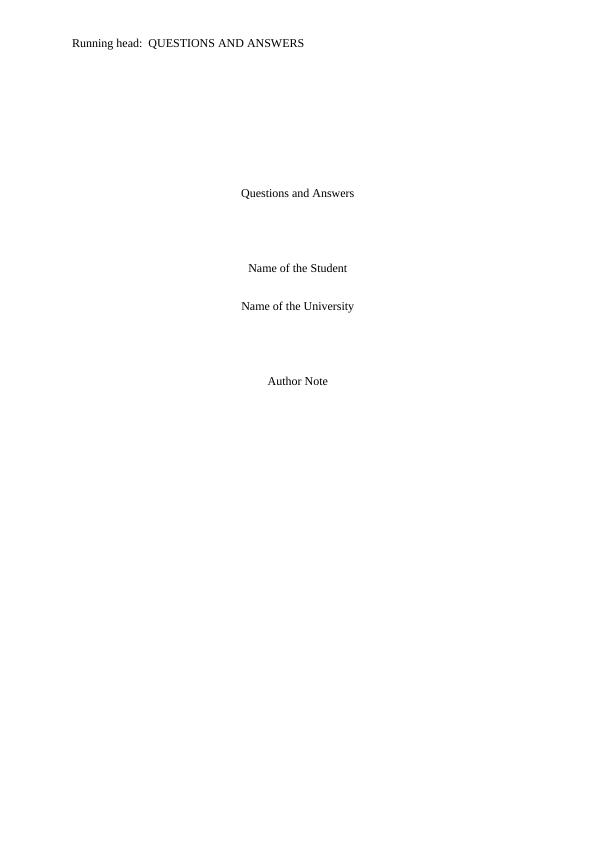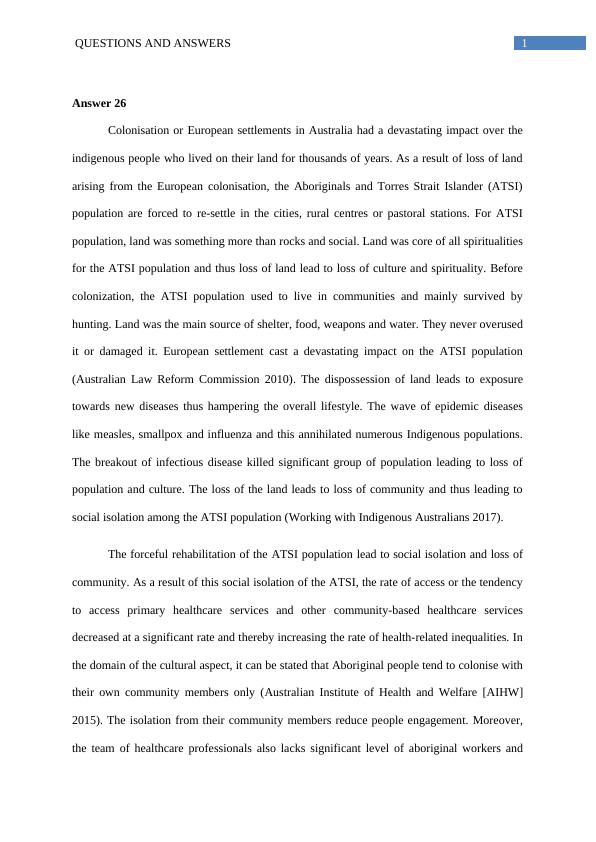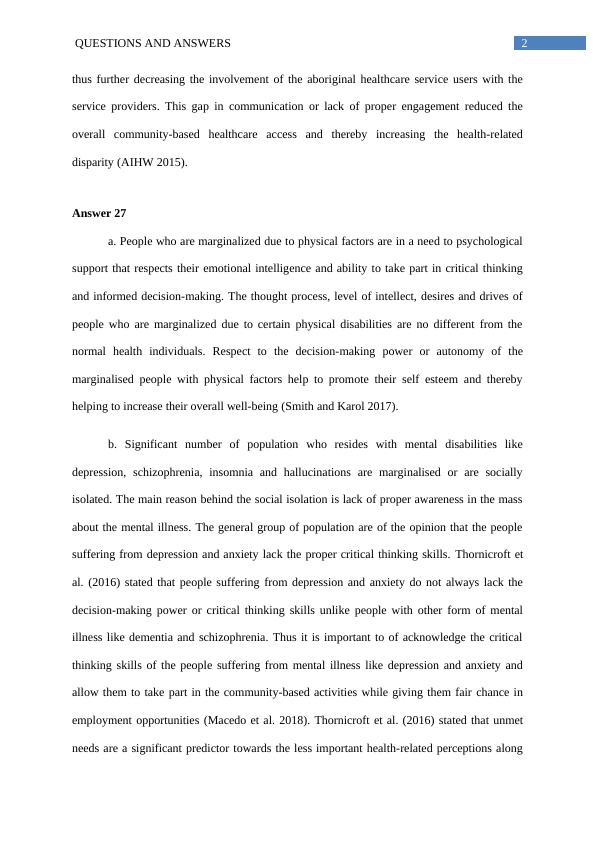Impact of Colonisation on Aboriginal and Torres Strait Islander Population and Marginalised People with Physical, Mental and Emotional Health Issues
Added on 2022-08-10
10 Pages2351 Words302 Views
Running head: QUESTIONS AND ANSWERS
Questions and Answers
Name of the Student
Name of the University
Author Note
Questions and Answers
Name of the Student
Name of the University
Author Note

1QUESTIONS AND ANSWERS
Answer 26
Colonisation or European settlements in Australia had a devastating impact over the
indigenous people who lived on their land for thousands of years. As a result of loss of land
arising from the European colonisation, the Aboriginals and Torres Strait Islander (ATSI)
population are forced to re-settle in the cities, rural centres or pastoral stations. For ATSI
population, land was something more than rocks and social. Land was core of all spiritualities
for the ATSI population and thus loss of land lead to loss of culture and spirituality. Before
colonization, the ATSI population used to live in communities and mainly survived by
hunting. Land was the main source of shelter, food, weapons and water. They never overused
it or damaged it. European settlement cast a devastating impact on the ATSI population
(Australian Law Reform Commission 2010). The dispossession of land leads to exposure
towards new diseases thus hampering the overall lifestyle. The wave of epidemic diseases
like measles, smallpox and influenza and this annihilated numerous Indigenous populations.
The breakout of infectious disease killed significant group of population leading to loss of
population and culture. The loss of the land leads to loss of community and thus leading to
social isolation among the ATSI population (Working with Indigenous Australians 2017).
The forceful rehabilitation of the ATSI population lead to social isolation and loss of
community. As a result of this social isolation of the ATSI, the rate of access or the tendency
to access primary healthcare services and other community-based healthcare services
decreased at a significant rate and thereby increasing the rate of health-related inequalities. In
the domain of the cultural aspect, it can be stated that Aboriginal people tend to colonise with
their own community members only (Australian Institute of Health and Welfare [AIHW]
2015). The isolation from their community members reduce people engagement. Moreover,
the team of healthcare professionals also lacks significant level of aboriginal workers and
Answer 26
Colonisation or European settlements in Australia had a devastating impact over the
indigenous people who lived on their land for thousands of years. As a result of loss of land
arising from the European colonisation, the Aboriginals and Torres Strait Islander (ATSI)
population are forced to re-settle in the cities, rural centres or pastoral stations. For ATSI
population, land was something more than rocks and social. Land was core of all spiritualities
for the ATSI population and thus loss of land lead to loss of culture and spirituality. Before
colonization, the ATSI population used to live in communities and mainly survived by
hunting. Land was the main source of shelter, food, weapons and water. They never overused
it or damaged it. European settlement cast a devastating impact on the ATSI population
(Australian Law Reform Commission 2010). The dispossession of land leads to exposure
towards new diseases thus hampering the overall lifestyle. The wave of epidemic diseases
like measles, smallpox and influenza and this annihilated numerous Indigenous populations.
The breakout of infectious disease killed significant group of population leading to loss of
population and culture. The loss of the land leads to loss of community and thus leading to
social isolation among the ATSI population (Working with Indigenous Australians 2017).
The forceful rehabilitation of the ATSI population lead to social isolation and loss of
community. As a result of this social isolation of the ATSI, the rate of access or the tendency
to access primary healthcare services and other community-based healthcare services
decreased at a significant rate and thereby increasing the rate of health-related inequalities. In
the domain of the cultural aspect, it can be stated that Aboriginal people tend to colonise with
their own community members only (Australian Institute of Health and Welfare [AIHW]
2015). The isolation from their community members reduce people engagement. Moreover,
the team of healthcare professionals also lacks significant level of aboriginal workers and

2QUESTIONS AND ANSWERS
thus further decreasing the involvement of the aboriginal healthcare service users with the
service providers. This gap in communication or lack of proper engagement reduced the
overall community-based healthcare access and thereby increasing the health-related
disparity (AIHW 2015).
Answer 27
a. People who are marginalized due to physical factors are in a need to psychological
support that respects their emotional intelligence and ability to take part in critical thinking
and informed decision-making. The thought process, level of intellect, desires and drives of
people who are marginalized due to certain physical disabilities are no different from the
normal health individuals. Respect to the decision-making power or autonomy of the
marginalised people with physical factors help to promote their self esteem and thereby
helping to increase their overall well-being (Smith and Karol 2017).
b. Significant number of population who resides with mental disabilities like
depression, schizophrenia, insomnia and hallucinations are marginalised or are socially
isolated. The main reason behind the social isolation is lack of proper awareness in the mass
about the mental illness. The general group of population are of the opinion that the people
suffering from depression and anxiety lack the proper critical thinking skills. Thornicroft et
al. (2016) stated that people suffering from depression and anxiety do not always lack the
decision-making power or critical thinking skills unlike people with other form of mental
illness like dementia and schizophrenia. Thus it is important to of acknowledge the critical
thinking skills of the people suffering from mental illness like depression and anxiety and
allow them to take part in the community-based activities while giving them fair chance in
employment opportunities (Macedo et al. 2018). Thornicroft et al. (2016) stated that unmet
needs are a significant predictor towards the less important health-related perceptions along
thus further decreasing the involvement of the aboriginal healthcare service users with the
service providers. This gap in communication or lack of proper engagement reduced the
overall community-based healthcare access and thereby increasing the health-related
disparity (AIHW 2015).
Answer 27
a. People who are marginalized due to physical factors are in a need to psychological
support that respects their emotional intelligence and ability to take part in critical thinking
and informed decision-making. The thought process, level of intellect, desires and drives of
people who are marginalized due to certain physical disabilities are no different from the
normal health individuals. Respect to the decision-making power or autonomy of the
marginalised people with physical factors help to promote their self esteem and thereby
helping to increase their overall well-being (Smith and Karol 2017).
b. Significant number of population who resides with mental disabilities like
depression, schizophrenia, insomnia and hallucinations are marginalised or are socially
isolated. The main reason behind the social isolation is lack of proper awareness in the mass
about the mental illness. The general group of population are of the opinion that the people
suffering from depression and anxiety lack the proper critical thinking skills. Thornicroft et
al. (2016) stated that people suffering from depression and anxiety do not always lack the
decision-making power or critical thinking skills unlike people with other form of mental
illness like dementia and schizophrenia. Thus it is important to of acknowledge the critical
thinking skills of the people suffering from mental illness like depression and anxiety and
allow them to take part in the community-based activities while giving them fair chance in
employment opportunities (Macedo et al. 2018). Thornicroft et al. (2016) stated that unmet
needs are a significant predictor towards the less important health-related perceptions along

End of preview
Want to access all the pages? Upload your documents or become a member.
Related Documents
Health And Welfare Of Social Concernslg...
|16
|4391
|14
Australian Healthcare System: Addressing Inequities for Aboriginals and Torres Strait Islanderslg...
|9
|2646
|58
Healthcare Assignment 2022lg...
|6
|1098
|15
Culture and History of Koori community Assignment 2022lg...
|6
|1022
|97
Report on Current Issues in Professional Practicelg...
|13
|3542
|100
Deconstructing the Question: Why Don't Aboriginals Take an Interest in Health and Well-being?lg...
|9
|2213
|224
